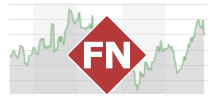BRUSSELS/FRANKFURT/PARIS (dpa-AFX) - European Central Bank Chief Economist Philip Lane said on Monday that policymakers will follow a data-dependent approach in every policy session in the coming months and any increase in the degree of downside risks could warrant a modest reduction in interest rates.
'In addition to the evolution of the baseline inflation outlook, shifts in the risk distribution will also matter for our rate decisions: an increase in the likelihood or intensity of downside risk factors would strengthen the case that a slightly-lower policy rate might better protect the medium-term inflation target,' Lane said in speech at an ECB conference in Frankfurt.
The ECB left interest rates unchanged for a second time in September. Eurozone interest rates were last revised in June when they were reduced by 25-basis point. The bank had cut interest rates by a quarter basis points each in every rate-setting session since September last year.
'Alternatively, an increase in the likelihood or intensity of upside risk factors would indicate that maintaining the current policy rate would be appropriate in the near term,' Lane said.
Euro area inflation accelerated to 2.2 percent in September as the decline in energy prices slowed, while services costs rose at a faster pace. Core inflation that excludes prices of food and energy was steady at 2.3 percent.
The ECB Staff has projected the headline inflation to ease sharply to 1.7 percent next year from 2.1 percent this year. Core inflation was expected to average 2.4 percent this year and 1.9 percent next year.
In a speech last week, the ECB President Christine Lagarde said risks to inflation appear to be well contained.
While markets look for more easing from the central bank for the single currency region, another rate cut is widely expected to materialize only next year.
Lane highlighted that the impact on energy prices and the impact on the euro were the two main risk factors under consideration. He noted that the sensitivity of overall inflation to energy inflation is state-dependent and will be lower under subdued demand conditions.
A persistent appreciation of the euro will have 'a multi-year impact' on economic activity and inflation, the economist noted. 'These effects will be larger than the average if euro appreciation is more due to external factors such as weakness in main trading partners or portfolio rebalancing due to an increase in the risk premium in overseas financial markets,' Lane said.
Copyright(c) 2025 RTTNews.com. All Rights Reserved
Copyright RTT News/dpa-AFX
© 2025 AFX News

